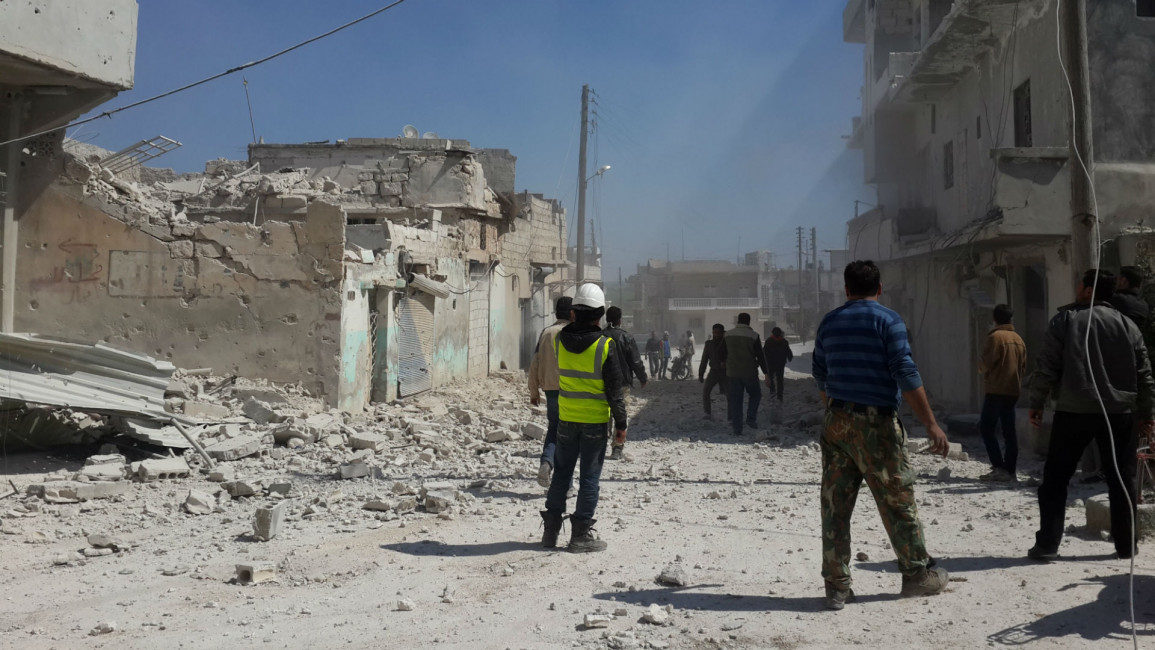The fall of Idlib: A Pyrrhic victory?
The fall of Idlib: A Pyrrhic victory?
Analysis: The fall of Idlib to a coalition of rebel groups was a major setback for the Syrian regime. But the government's response is likely to be swift and brutal.
3 min read
Idlib has been battered by the four years of warfare in Syria [Anadolu]
Government forces withdrew from the city of Idlib in northern Syria on Saturday following four days of fierce fighting with a coalition of Islamist brigades led by the Nusra Front, the Syrian franchise of al-Qaeda.
The regime's ousting from Idlib is an important victory for rebel forces, effectively putting a brake on the momentum built up by the regime during fighting last summer.
The main city in a mostly rural province that was among the first to rise up against the Assad regime in 2011, Idlib is only the second provincial capital to fall to rebel forces in a civil war that has now entered its fifth year. The first was Raqqa, which the Islamic State group has since turned into its de facto capital.
Jaysh al-Fateh ["Soldiers of Conquest"], a coalition of eight rebel brigades led by the Nusra Front, advanced southwards from Idlib on Monday to within a kilometre of the regime's al-Mastoumah military base, where regime forces had taken refuge after being ousted from the city.
Government forces responded with airstrikes against rebel positions.
Damascus initially denied the fall of Idlib, but a pro-government newspaper on Monday reported that the army had intensified its strikes against "terrorist groups" in the city, killing hundreds of militants, and that Nusra fighters had raised the al-Qaeda flag over government buildings there.
Idlib is strategically valuable because of its position at the intersection of two vital transport corridors. It sits 10km from where the M5, the main highway from the capital Damascus to the key northern city of Aleppo, meets the M4, which branches off towards the regime's coastal stronghold of Latakia.
In theory, this should allow rebels to further isolate regime forces in the north.
But rebel celebrations are unlikely to last long. When the regime's ground troops are pushed out of an area, it has a pattern of responding with a heavy, indiscriminate aerial bombardment on civilian areas, primarily with crude, locally produced barrel bombs.
On Monday, an opposition outlet published a video it said was the aftermath of a regime airstrike in Idlib.
Free Syrian Army sources told al-Araby al-Jadeed that regime forces in Hama airbase were preparing a massive aerial campaign against the city, using weapons including scud missiles and chlorine gas.
"Regime forces are preparing to destroy Idlib," said an FSA source who asked not to be named. "The FSA's intelligence services have received information that senior people have been given orders to prepare scud missiles to target Idlib in order to destroy the city."
While pushing government forces out of Idlib is a hard-won victory for the rebel coalition, fears are mounting that the government response could devastate the town. A major aerial campaign in the coming days could cause yet another wave of refugees to flee towards neighbouring Turkey.
The regime's ousting from Idlib is an important victory for rebel forces, effectively putting a brake on the momentum built up by the regime during fighting last summer.
The main city in a mostly rural province that was among the first to rise up against the Assad regime in 2011, Idlib is only the second provincial capital to fall to rebel forces in a civil war that has now entered its fifth year. The first was Raqqa, which the Islamic State group has since turned into its de facto capital.
Jaysh al-Fateh ["Soldiers of Conquest"], a coalition of eight rebel brigades led by the Nusra Front, advanced southwards from Idlib on Monday to within a kilometre of the regime's al-Mastoumah military base, where regime forces had taken refuge after being ousted from the city.
Government forces responded with airstrikes against rebel positions.
Damascus initially denied the fall of Idlib, but a pro-government newspaper on Monday reported that the army had intensified its strikes against "terrorist groups" in the city, killing hundreds of militants, and that Nusra fighters had raised the al-Qaeda flag over government buildings there.
Idlib is strategically valuable because of its position at the intersection of two vital transport corridors. It sits 10km from where the M5, the main highway from the capital Damascus to the key northern city of Aleppo, meets the M4, which branches off towards the regime's coastal stronghold of Latakia.
In theory, this should allow rebels to further isolate regime forces in the north.
But rebel celebrations are unlikely to last long. When the regime's ground troops are pushed out of an area, it has a pattern of responding with a heavy, indiscriminate aerial bombardment on civilian areas, primarily with crude, locally produced barrel bombs.
On Monday, an opposition outlet published a video it said was the aftermath of a regime airstrike in Idlib.
Free Syrian Army sources told al-Araby al-Jadeed that regime forces in Hama airbase were preparing a massive aerial campaign against the city, using weapons including scud missiles and chlorine gas.
"Regime forces are preparing to destroy Idlib," said an FSA source who asked not to be named. "The FSA's intelligence services have received information that senior people have been given orders to prepare scud missiles to target Idlib in order to destroy the city."
While pushing government forces out of Idlib is a hard-won victory for the rebel coalition, fears are mounting that the government response could devastate the town. A major aerial campaign in the coming days could cause yet another wave of refugees to flee towards neighbouring Turkey.



